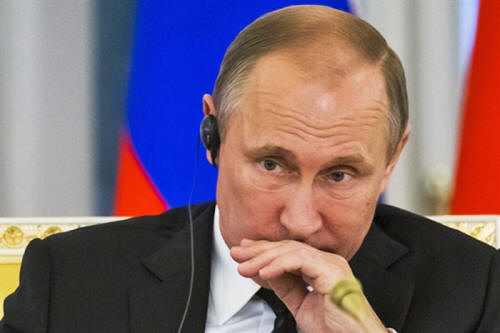|
from WorldPoliticsReview Website
at a news conference in the Konstantin palace, outside St. Petersburg, Russia, Aug. 9, 2016
(AP photo by
Alexander Zemlianichenko).
Richard Gowan explains why Vladimir Putin, if he ever loses interest in running Russia, "should set up a diplomatic academy." Putin’s skillful "attritional diplomacy," he writes, has kept the West
permanently
off balance.
The British journalist and wit David Frost once defined diplomacy as,
Through a mix of hard bargaining, guile
and simple force, the Russian president has often shown that he
knows how to do just that.
He then
ignited a new crisis with Kiev over an alleged shoot-out between
Ukrainian and Russian security personnel in Crimea. Both maneuvers
left Western officials rather rattled.
Some analysts fear that Putin plans to grab more Ukrainian territory.
Others suspect that he is talking tough
to boost his domestic support before upcoming parliamentary
elections. Either way, he has once more proved his knack for using
sharp diplomatic tactics to keep other powers off balance.
But Putin also knows how to use different types of diplomacy to maximize his leverage. He is good at using personal diplomacy to win over other leaders, even when they do not want to be impressed.
In 2013, he reportedly seeded the idea to dismantle Syria's chemical weapons with U.S. President Barack Obama on the sidelines of a G-20 summit.
Putin was quick to call Erdogan in July after the failed
putsch while Western leaders dithered,
gaining points with the Turkish president.
But Putin also knows how to twist drawn-out diplomatic processes to
his advantage.
Moscow has insisted on handling the Syrian crisis through the United Nations, and permitted the Organization for Security and Cooperation in Europe (OSCE) to monitor Ukraine.
As I noted last week, Putin has even been keen to forge new frameworks for diplomacy, such as the "Normandy group", comprising,
...that is supposed to resolve the festering crisis in eastern Ukraine.
By referring back to international
institutions and diplomatic processes, Putin offers nervous Western
leaders the impression, whether real or illusory, that he ultimately
desires stability.
Reviewing Russia's behavior over Syria in mid-2015, I argued that it was marked by three characteristics that still seem valid:
Russian diplomats have been playing very
similar games in recent weeks during the siege of Aleppo, using
offers of temporary cease-fires and humanitarian corridors
to deflect serious talks on ending the battle. Putin has followed a similar playbook in Ukraine. Russia has stalled on many aspects of the implementation of the 2015 "Minsk process" backed by the Normandy group to stabilize the east of the country.
According to the International Crisis Group, it has looked for,
As Fredrik Wesslau argues, Russia's goal may be to drag out the proceedings until the U.S. and European Union tire of keeping Ukraine-related sanctions on Moscow:
This is attritional diplomacy.
Delays and setbacks help Moscow wear down the West's willingness to keep on sparring with Russia. A nasty little crisis every now and again helps refocus everyone's attention on the need for more bargaining.
Putin has declared that he
will boycott the next meeting of
the Normandy group, slated for
the sidelines of the G-20 summit in Beijing in September, over the
Crimean incident.
German Foreign Minister Frank-Walter Steinmeier headed to Russia today for talks on both Syria and Ukraine, declaring that there is no "standoff" with Moscow.
Unless Russia is firmly set on a new war in Ukraine, and perhaps even if it is, Western powers will inevitably look for ways to keep talks alive. The new British government of Prime Minister Theresa May has stated its desire to "normalize" relations with Moscow.
The Obama administration is
sliding toward its last months in office, and seems desperate to get
some sort of bargain over Syria.
But, as Paul Quinn-Judge notes, the Ukrainian government has also dragged its feet over implementing elements of the Minsk accords, especially those offering a special status to secessionist areas.
In the meantime,
as I
argued some weeks ago, the U.S. and its allies have little
choice but to work more closely with Russia in Syria after the
Turkish coup, and the Putin-Erdogan meeting clearly reinforces this.
Like it or not, that's damnably deft diplomacy...
|


